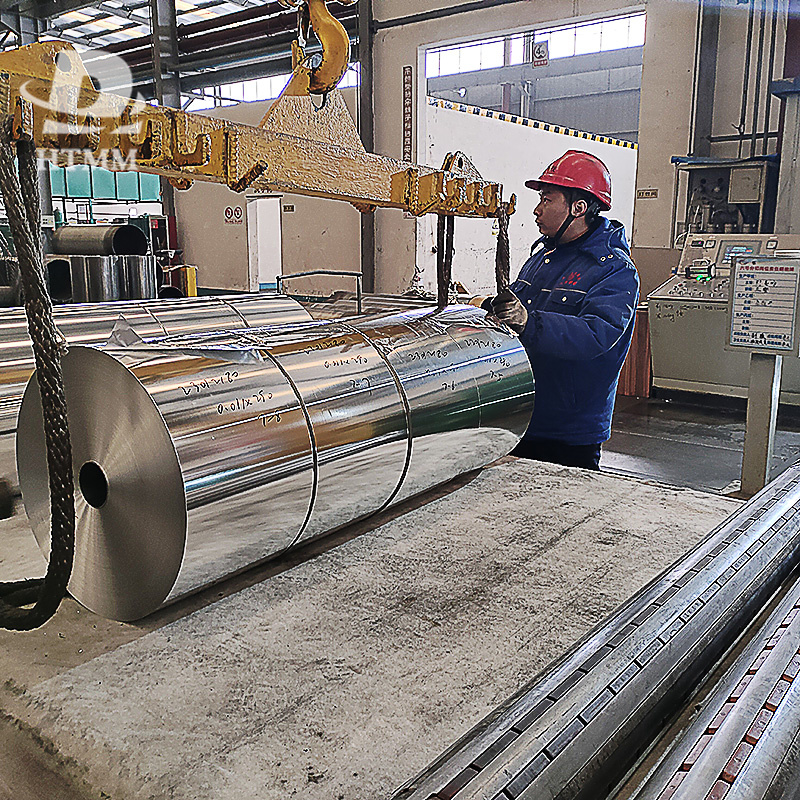What is 8011 Aluminum Foil?
8011 aluminum foil refers to the numeric alloy and temper designation for a type of aluminum commonly used for household foil products. The 8011 designation indicates the aluminum contains at least 92.5% pure aluminum with manganese as the major alloying element. This alloy provides aluminum foil with a smooth, reflective surface ideal for wrapping and lining.

As a roll product, 8011 aluminum foil is produced in wide widths between 12-24 inches to provide more material per roll compared to standard consumer packaging sizes. These extra large or "jumbo" rolls allow for bigger household projects like stove mats without requiring multiple standard foil packages. The thin gauge of 8011 aluminum foil, typically ranging between 0.0007-0.0010 inches thick, makes it pliable and easy to work with for various applications.
Making Effective Stove Mats with Aluminum Foil
Cutting aluminum foil from an 8011 jumbo roll provides more than enough material to craft multiple stove mats for the kitchen. There are a few different methods for construct stove mats utilizing the foil:
Cut rectangular sheets: Measure and mark rectangle shapes slightly larger than the base dimensions of cookware. Fold edges under for a finished appearance.
Form fitted mats: Lay cookware item upside down on foil and use it as a template to trace the shape. Cut out along the traced line.
Overlay technique: For especially heavy pots and pans, create a double layer mat by placing one foil sheet on top of the other and cutting them together for reinforcement.
Once shaped, the mats can be placed on the stovetop surface under pots, pans and other cookware during heating and cooking. The reflective nature of aluminum foil keeps heat directed toward the cookware rather than intense stovetop surfaces below. This insulation prevents hot spots that could damage delicate stovetops over time.
Benefits of Aluminum Foil Stove Mats
Stove mats formed from 8011 aluminum foil rolls provide several advantages for stovetop protection compared to using nothing or other materials:
Heat Reflection - As mentioned, aluminum foil's reflective properties help reflect heat away from stovetop surfaces underneath cookware. This shields delicate stovetop coatings from hot spots or scorching.
Scratch Resistance - The soft malleable nature of aluminum foil prevents cookware bottoms from directly contacting stovetops, thus avoiding surface scratches that come with metal-on-metal contact over heating cycles.
Easy Cleaning - Spilled or splattered food debris wipes clean easily from a foil mat surface. The foil mats are also disposable - simply remove soiled mats and replace with fresh portions cut from the aluminum foil roll.
Inexpensive - A single large 8011 aluminum foil roll provides material for multiple stove mat replacements over time at a very low cost compared to other heat-resistant mat options.
Convenience - Ready-made fitted mats in a variety of cookware sizes eliminate the need to measure, trace and cut individual mats each time protectors are needed.
Durability - Properly formed to protectively cradle cookware bottoms, aluminum foil mats maintain protection over repeated uses and cleaning without deterioration.
Making and Using Effective Stove Mats
 The following instructions provide a guide for constructing durable stove mats using 8011 aluminum foil rolls:
The following instructions provide a guide for constructing durable stove mats using 8011 aluminum foil rolls:Materials Needed:
8011 Aluminum foil roll (12-24 inches wide)
Scissors or utility knife
Cookware items to create mats for
Instructions:
Unroll a generous portion of foil from the roll and cut or tear to release. Lay foil flat on a work surface.
Place the bottom of a pot, pan or other cookware item upside down directly on the foil. Use the item as a tracing guide.
Carefully trace around the entire bottom edges of the cookware with a pen or marker directly on the foil. Be sure to allow for at least a 1/2 inch border beyond the traced line.
Use scissors to carefully cut out the traced shape, following the line very closely. Remove any excess foil remains.
For tight-fitting shaped pots, use your fingers or a spoon handle to gently crease and form the foil mat corners for a snug fit.
For especially heavy items, repeat steps 2-4 to create a double thickness mat by overlaying a second foil sheet and cutting both layers together.
Place the finished stove mat directly on the stovetop cooking surface before heating cookware. The reflective foil surface should face up.
After cooking, simply lift and dispose of the soiled mat, then replace with a fresh protective mat from the aluminum foil roll supply.
Tips for Using Aluminum Foil Stove Mats Effectively:
Place mats only on smooth, clean stovetop areas for best contact and protection.
Use mats appropriate to the size of cookware bottom for full coverage without excess foil hanging over stovetop edges.
Replace mats anytime they become soiled, creased or develop burn marks for optimal heat reflection.
Store extra pre-cut foil stove mats in a covered container near the stovetop for easy access when needed.
Consider stocking multiple mat shapes and sizes cut from a jumbo foil roll for various pots, pans and cooking needs.
Optionally laminate stove mats with parchment paper for a non-stick surface that allows easy food release.
Benefits of Aluminum Foil Stove Mats Summarized
In conclusion, using aluminum foil from an 8011 jumbo roll to construct customized stove mats provides a simple, convenient and very economical solution for protecting delicate stovetops. The reflective and insulating properties of aluminum foil shield surfaces from hot spots and scratches. Mats readily conform to various cookware sizes and shapes. Best of all, the disposable foil mats require no cleaning other than gentle wiping - simply replace soiled mats with fresh pre-cut portions from the large foil roll supply. Home cooks gain durable stovetop protection for minimal cost and effort through aluminum foil stove mats. Their convenient use enhances both cooking performance and the longevity of valued cooking surfaces.

